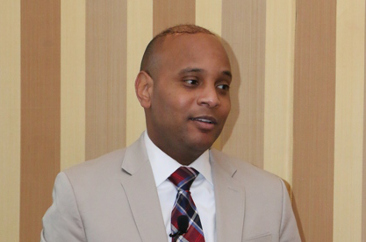|
|
| Improving Collaboration Between Health Staff and Correctional Officers |
| By Barbara Storms Granner, NCCHC |
| Published: 11/28/2016 |

While attempting to work collaboratively within a correctional environment, correctional officers and mental health staff may sometimes feel like they have competing missions. At the National Conference on Correctional Health Care in October, Mark Fleming, PhD, CCHP-MH, Vice President of Operations, Corizon Health, explained why that disconnect may exist in some situations, and offered tools for bridging the potential divide and finding ways to effectively work together. One of the biggest barriers between COs and mental health staff, Dr. Fleming said, can be the perceptions and misperceptions of each group toward the other. At times, corrections can see mental health people as naïve, gullible and prone to excusing inmate behavior, even possibly representing a security threat; mental health staff may see COs as unnecessarily harsh and punitive. In order to work together effectively, both groups should understand the ways in which their missions differ – as do their professional and ethical job requirements and their approaches to managing difficult behaviors. The primary mission of security staff is to maintain order and secure the environment through punishment or the risk of punishment. The primary mission of mental health, on the other hand, is to identify, assess and treat individual patients’ psychological disorders. Mental health care is founded on the principle of client self-determination, strives to increase client autonomy, and operates in a fairly flat organizational structure based on cooperation. Security, on the other hand, is founded on the need to maintain security, strives to enforce obedience to authority, and operates in a hierarchical organizational structure based on compliance. It’s really no surprise, then, that these two groups may not fully comprehend each other’s mission; they are looking through different professional lenses. No wonder there is sometimes confusion and misunderstanding. Dr. Fleming suggested some concrete, practical steps to help build respect and understanding between the two groups:
He also provided an example of a successful training program that the National Alliance on Mental Illness-Indiana created for the Indiana Department of Correction. Over the course of five weeks, the program introduced correctional staff to the major categories of psychiatric disorders; explained the biological and chemical components of mental illness; discussed medications and psychological treatments that might be used in a correctional setting; and focused on how to interact effectively with people with mental illness. Dr. Fleming concluded by saying that even without such programs and policies in place, understanding and respecting each other’s jobs and missions can go a long way toward creating an environment of true collaboration. Barbara Storms Granner is the Marketing & Communications Manager at NCCHC. NCCHC’s Spring Conference for Correctional Health Care will be held April 29-May 2 in Atlanta. For more information, go to www.ncchc.org. |
Comments:
Login to let us know what you think
MARKETPLACE search vendors | advanced search

IN CASE YOU MISSED IT
|


blog commenting packages Great write-up, I am a big believer in commenting on blogs to inform the blog writers know that they’ve added something worthwhile to the world wide web!..
Khi mẹ nhận thấy được rằng vết rạch tầng sinh môn bị hở hay vết khâu tầng sinh môn bị ngứa, đau, rát, sưng đỏ, thậm chí xuất huyết thì hãy lập tức đến bệnh viện để được khám và chữa trị kịp thời.
Hey everyone! If you are searching for the important and useful information regarding QuickPay Portal and its services, sign up, bill payment etc., I can help you out by providing a reference website. Insuranceservicenow.Com
nice site indeed. Quickpayportal
This is definitely a problem and I can see the rift between the officers and the health staff. Officers don't want to address bad behavior as a mental problem, they just want to penalize it with punishment. The health staff identifies bad behavior as a mental problem and wants to treat it. Big problem. myindigocard.com
Hey, I am happy to join this site i like this Article Quickpayportal. Thanks for sharing
Hey everyone! If you are searching for the important and useful information regarding QuickPay Portal and its services, sign up, bill payment etc., I can help you out by providing a reference website. www.quickpayportal.com